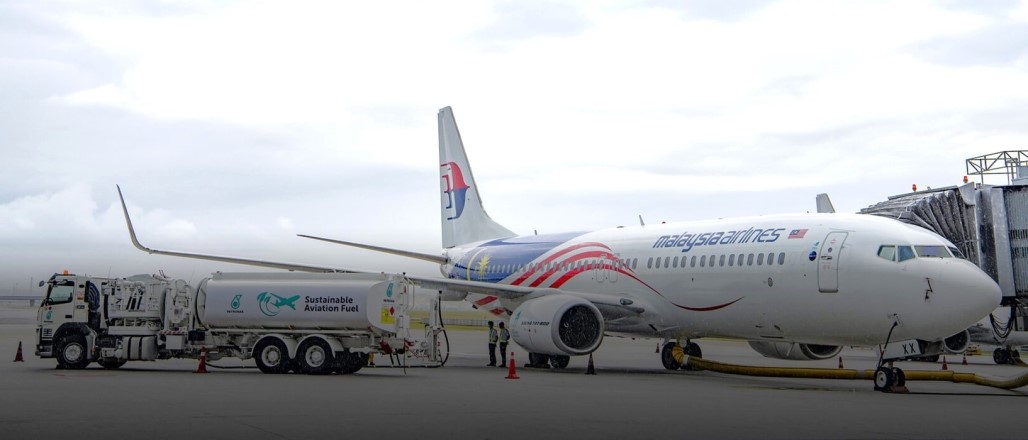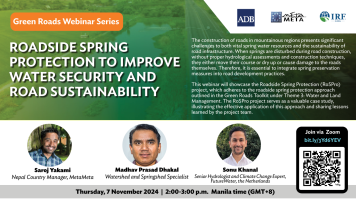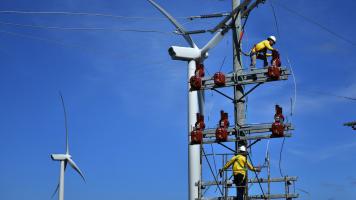
Malaysia Airlines operated its first flight using fuel produced from renewable waste and residue raw materials on World Environment Day in 2022. Photo credit: Malaysia Airlines.
Initiatives include shifting to sustainable aviation fuel and more environment-friendly transportation modes, such as electric vehicles.
Tourism and transport ministers in Southeast Asia have agreed to actively promote sustainable practices at the national level and through regional and sectoral cooperation. These include supporting the shift to sustainable aviation fuel and more environment-friendly transportation modes, such as electric vehicles.
At the Interface Meeting between ASEAN Tourism Ministers and ASEAN Transport Ministers on 10 November 2023, the ministers said economic and tourism recovery in the region is increasing the demand for travel. They agreed that “stronger cooperation between the tourism and transport sectors is essential toward achieving the common objectives of sustainable tourism development, increasing connectivity, and promoting seamless travel experiences in the ASEAN region.”
The meeting was chaired by the Lao People’s Democratic Republic (Lao PDR) and was held in hybrid format.
Tourism recovery
The World Tourism Organization said international tourism is on track to reach 80% to 95% of pre-pandemic levels in 2023. Prospects for September–December 2023 point to continued recovery, driven by the still pent-up demand and increased air connectivity particularly in Asia and the Pacific where recovery is still subdued.
A study by the Asian Development Bank (ADB) sees airlines from Southeast Asia recovering 90% of their capacity by the end of 2023. However, the path to full recovery will be challenging. Fleet and staff constraints, changing travel patterns and expectations, and growing environmental concerns demand new strategies and business models and increasing regional and multisectoral collaboration.
Recommendations of the ADB study include improving intraregional connectivity, particularly at secondary destinations; beefing up freight capacity; embracing digitalization and new technologies; and advancing decarbonization in aviation.
Highly interconnected sectors
The ASEAN ministers said the transport and tourism sectors need to work closely together and identified four areas that require more integrative action.
Connectivity. Enhance air, maritime, and land connectivity further to promote seamless cross-border travel.
Sustainable development. Both sectors have a joint responsibility to protect the environment and support the global goal toward net-zero emissions. Measures include “encouraging the use of more eco-friendly transportation modes, introducing wider eco-tourism standards, adopting sustainable development guidelines for the transport and tourism sector in ASEAN, and supporting the advancement of relevant policy recommendations to facilitate the transition toward more eco-friendly transport options, and enabling destinations to establish themselves as champions of sustainability.”
Collaboration with stakeholders. Encourage public–private partnerships, such as with travel agencies, tour operators, airlines, and transport service providers. Promote the sharing of knowledge and best practices, which will market the region as a single destination and amplify ASEAN’s “A Destination for Every Dream” campaign. Collaboration with local communities will also ensure that they participate in decision-making and their needs are considered.
Quality of data. Use technology to improve the quality of data, promote data exchanges between the sectors, and fill information gaps.
Toward carbon neutrality
The ministers noted that tourism is “a vehicle for achieving the UN-Sustainable Development Goals” and underscored “the importance of promoting the integration of environmentally sustainable transportation and renewable energy solutions to support the ASEAN Strategy for Carbon Neutrality and the ASEAN Framework on Sustainable Tourism Development.”
At the 29th ASEAN Transport Ministers Meeting held on 9 November 2023, in Luang Prabang, Lao PDR, the group adopted the ASEAN Sustainable Aviation Action Plan (ASAAP) and its Work Plan 2023–2024, which will drive sustainable aviation growth, starting with the use of sustainable aviation fuel. “This demonstrates ASEAN’s strong commitment to support the International Civil Aviation Organization’s long-term global aspirational goal for international aviation of net-zero carbon emissions by 2050,” the transport ministers said.
Indonesia and Malaysia, both major palm oil producers, have announced that they are developing sustainable aviation fuel using palm oil or palm waste.
The transport meeting also adopted Policy Recommendations to Improve Electric Vehicle (EV) Infrastructure and Charging Stations in ASEAN, which also provides guidance for the development of supporting infrastructure, including the electrical grid and EV supply equipment.
ASEAN member states support the transition to a sustainable transport system with cleaner fuels, vehicles, and vessels under the Kuala Lumpur ASEAN Transport Strategic Plan 2016–2025.
The market for electric vehicles in the region is expanding, but it is still quite small compared with other regions. A report by ADB, Bloomberg Philanthropies, ClimateWorks Foundation, and Sustainable Energy for All said the penetration rate of electric two-wheelers or motorcycles in total sales is currently less than 1% in most Southeast Asian countries. The study sees high growth potential once the right demand, supply, and infrastructure factors are in place.
This article was first published by BIMP-EAGA on 11 November 2023.

BIMP-EAGA
The Brunei Darussalam–Indonesia–Malaysia–Philippines East ASEAN Growth Area, or BIMP-EAGA, is a cooperation initiative established in 1994 to spur development in remote and less developed areas in the four participating Southeast Asian countries.

